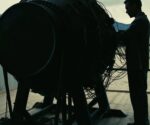The ‘absolutely incredible’ war film that ‘checks all the boxes’ | Films | Entertainment
An unforgettable performance by Tom Cruise brought Oliver Stone’s ‘Born on the fourth of July’ to life. The film tells the story of Ron Kovic, who enlists in the Marines during the Vietnam War, fulfilling what he sees as his patriotic duty. Kovic survived his first tour before volunteering and heading back into the warzone, where he accidentally kills a comrade before he becomes permanently paralysed in battle.
The marine came home to a hostile environment featuring an uncaring Veterans Administration bureaucracy and people who failed to understand what he had been through — he became a passionate anti-war advocate. Kovic became one of the best-known peace activists among the Vietnam veterans, and was arrested a dozen times for political protesting. One of the most well-known incidents involving Kovic occurred in 1974, when he led a group of disabled Vietnam War veterans in wheelchairs on a 17-day hunger strike inside the Los Angeles office of Senator Alan Cranston. They protested the poor treatment in America’s veterans’ hospitals and demanded better treatment for returning veterans, plus a full investigation of all Veterans Administration (VA) facilities.
The strike continued to escalate until President Lyndon Johnson finally agreed to fly out from Washington, D.C., and meet with the veterans. The hunger strike ended soon after that and several months later, Johnson resigned. In late August 1974, Kovic travelled to Belfast, where he spent a week in the Catholic stronghold of Turf Lodge, interviewing both political activists and residents.
In a new introduction to his book, ‘Born on the Fourth of July’, rewritten in 2005 after originally being penned in 1976, Kovic stated: “I wanted people to understand. I wanted to share with them as nakedly and openly and intimately as possible what I had gone through, what I had endured. I wanted them to know what it really meant to be in a war, to be shot and wounded, to be fighting for my life on the intensive care ward, not the myth we had grown up believing.
“I wanted people to know about the hospitals and the enemy room, about why I had become opposed to the war, why I had grown more and more committed to peace and nonviolence. I had been beaten by the police and arrested twelve times for protesting the war and I had spent many nights in jail in my wheelchair.
“I had been called a communist and a traitor, simply for trying to tell the truth about what had happened in that war, but I refused to be intimidated.”
In 1989, on the last day of filming, Kovic presented actor Tom Cruise, who portrayed him in the movie, the original Bronze Star he had received, explaining to Cruise that he was giving him the medal as a gift ‘for his heroic performance’.
The true story film ended up being a box office hit and grossed over $162 million worldwide. On the film review website, the movie scored 84% with a total of 56 critics rating the Oliver Stone-directed feature.
The critic’s consensus on the site reads: “Led by an unforgettable performance from Tom Cruise, Born on the Fourth of July finds director Oliver Stone tackling thought-provoking subject matter with ambitious élan.”
New Yorkers’ Pauline Kael said: “Stone plays bumper cars with the camera and uses cutting to jam you in the action, and you can’t even enjoy his uncouthness, because it’s put at the service of sanctimony.”
Kevin Maher from The Times wrote: “A score from John Williams and aggressive direction from Oliver Stone make this the pre-eminent Vietnam War movie.”
Other reviewers called it an ‘absolutely incredible’ war film that ‘checks all the boxes’ and another stated, ‘it’s Tom Cruise’s best’.









